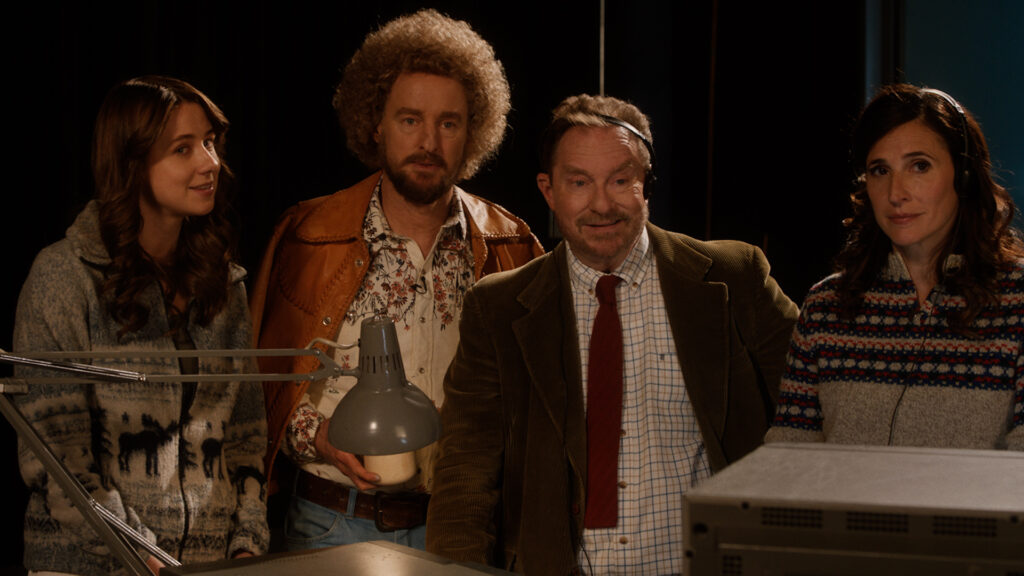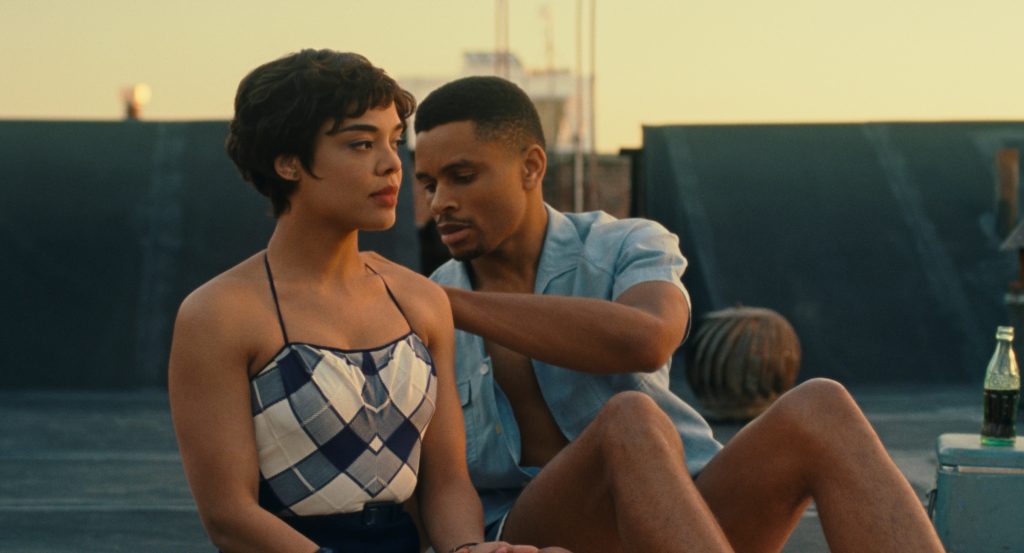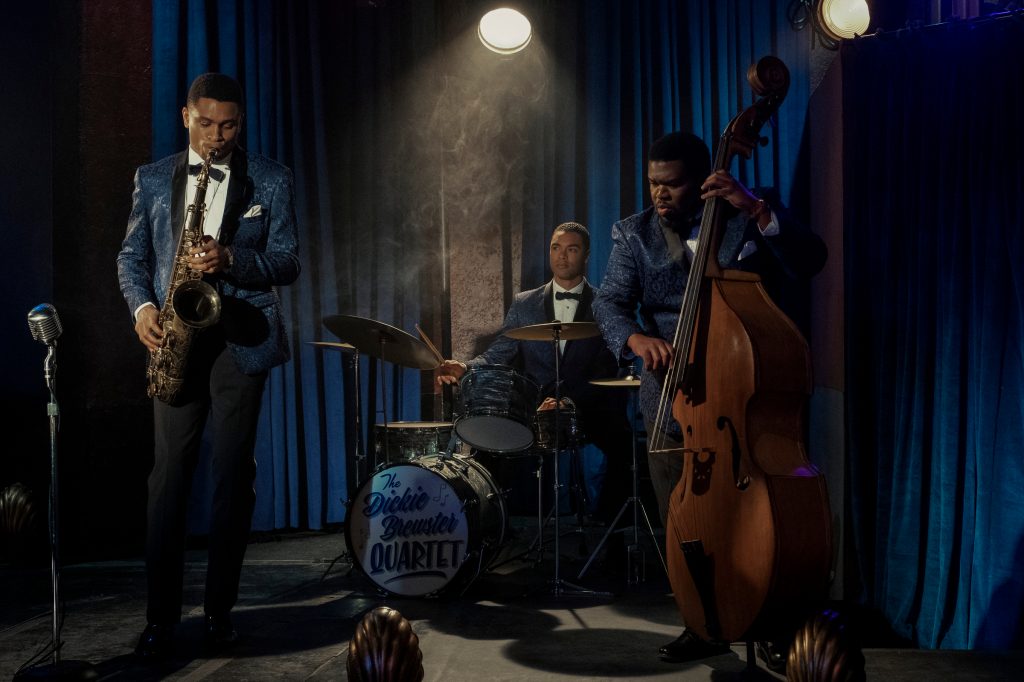April 4, 2023
by Carla Hay

Directed by Brit McAdams
Culture Representation: Taking place in Burlington, Vermont, the comedy film “Paint” (very loosely inspired by real-life TV personality Bob Ross) features a cast of predominantly white characters (with some African Americans and Latinos) representing the working-class and middle-class.
Culture Clash: Painter artist Carl Nargle, who has become semi-famous for making paintings on live television, has to reckon with his messy love life and a younger painter who has been hired to be his rival at the TV station where they work.
Culture Audience: “Paint” will appeal primarily to people who are fans of Ross and star Owen Wilson, but this rambling and unfunny movie is a “bait and switch” ripoff that goes off on weird and unwelcome tangents that have nothing to do with Ross.

“Paint” is one of the worst “bait and switch” movies of the year. A more accurate title for this dreadful dud would be “Like Watching Paint Dry.” That’s what it feels like to endure this listless and vapid comedy that fools people into thinking that it’s going to be a witty satire of Bob Ross. It’s really a bizarre mess.
Everything in the marketing of “Paint” gives the impression that the movie is supposed to about a Bob Ross-like character and a parody of how his talent and fame affect his life. But in the end, the only things resembling Ross in “Paint” are the character’s job, clothing and hairstyle. That’s why “Paint” is such a fraudulent film. The movie becomes a tedious repetition of the main character having problems with his female co-workers, as he sulks and frets about becoming a has-been.
As many people already know, Ross became famous for painting nature landscape portraits, often in real time on TV. He was the star/creator of the PBS TV series “The Joy of Painting,” which was on the air from 1983 to 1994. Ross had a soothing voice and gentle mannerisms that were both adored by his fans and insultingly mocked by his critics. Ross was also known for his 1970s hairstyle and clothing, but he wore this outdated look as if he didn’t care what people thought about it. Ross died of lymphoma in 1995, at the age of 52.
“Paint” (written and directed by Brit McAdams) certainly had the potential to take a smart and creative approach to a TV personality whose off-camera life was unknown to the vast majority of his audience. The movie looks like a series of badly written sketches strung together with the misguided assumption that just because the cast members are making mugging facial expressions for the camera, it’s automatically supposed to be funny. One of the biggest problems with “Paint” is that it’s filled with too many half-baked ideas that will leave viewers wondering: “What was the point of that scene? Where is this movie going? When is this garbage going to end?”
Owen Wilson portrays Carl Nargle, a painter artist who does paintings (mostly nature landscape portraits) live on TV, in a show that he stars in on the PBS TV affiliate in Burlington, Vermont. Therefore, unlike the real-life Ross, Carl’s fame has peaked as a local TV personality, not as a national or international TV personality. (“Paint” was actually filmed in New York state.)
The name of Carl’s show is “Paint With Carl Nargle.” Carl’s signature sign-off line is “Thanks for going to a special place with me.”He’s the type of painter who will give names to the things in nature that he paints, such as calling a blackberry bush Miss Marcy, or a naming a tree Arthur the Evergreen.
A montage in the beginning of the movie shows that Carl’s loyal audience includes senior citizens at a retirement home; lonely middle-aged women; and scruffy men who watch Carl’s show while they hang out at a bar. Carl’s dream is to have at least one of his paintings on display at the Burlington Museum of Art. Carl is stuck in the 1970s (including driving a 1970s van), but this movie is supposed to take place in the early 2020s.
Carl’s boss is a dishonest sleazebag named Tony (played by Stephen Root), who is the general manager of the TV station. Tony is the type of person who will insult people to their faces and then try to convince them it was a compliment. Tony is worried about the station’s declining ratings and tight budget. Carl is the most famous person who works at the TV station, but Carl’s ratings have also been sliding. Carl doesn’t think he’s replaceable, but Tony has other ideas.
Meanwhile, viewers quickly find out that Carl has a long history of getting romantically involved with his female co-workers. Tony’s assistant is Katherine (played by Michaela Watkins), who had a love affair with Tony more than 15 years ago, but their romance ended badly for both of them. As shown in flashbacks, after he became “famous,” Tony started to neglect Katherine. She cheated on Carl with a Vermont Mountain Express delivery guy (played by Ryan Gaul), in a one-time encounter. Carl then cheated on Katherine by having a short-lived fling with a co-worker named Wendy (played by Wendi McLendon-Covey), who is still bitter that Carl dumped her.
Wendy still works at the TV station, where she’s some type of producer for Carl’s show. Katherine has recently given notice to Tony that she’s quitting because she accepted a job offer to be the assistant to the general manager of the PBS TV affiliate in Albany, New York. Katherine seems to have mixed feelings about leaving Burlington. As the movie shows in several maudlin scenes, Katherine and Carl have not had closure over their relationship. Carl is still pining over Katherine, who shows signs that she’s still in love with him too.
A co-worker named Jenna (played by Lucy Freyer), who’s young enough to be Carl’s daughter, is very star-struck by him. One of the most cringeworthy aspects of the movie is how Jenna fawns over Carl and tries to seduce him. It’s supposed to be wry commentary on how Carl, who looks like a dork and has a limp personality, can still get young, attractive women to be interested in him because he has a little bit of fame. However, in “Paint,” it just comes across as looking creepy, awkward and misogynistic.
In fact, the way that all of the women are portrayed in “Paint” is creepy, awkward and misogynistic. There’s a scene where Carl is supposed to be interviewed by a young reporter named Alexandra Moore (played by Elizabeth Loyacano), who works for the Burlington Bonnet newspaper. It’s just an excuse for the movie to have Tony hurl some sexist remarks at her, and for Carl to assume that Alexandra wants to have sex with him as part of her interview.
The movie’s main storyline is a huge misfire. Tony hires a young painter to become direct competition to Carl. Her name is Ambrosia Long (played by Ciara Renée), who is another awestruck fan of Carl’s. Tony hires Ambrosia partly out of desperation and partly out of revenge, because Carl rejected Tony’s idea for Carl expand “Paint With Carl Nagle” from one hour to two consecutive hours. Carl thinks that if he started “cranking out” more paintings per year, it would decrease the value of his art.
Ambrosia is supposed to be everything that Carl is not: young, hip and edgy. She gets her own show. And as far as Carl is concerned, the competition is on to see if he or Ambrosia can get higher ratings. Ambrosia starts off being a little too edgy for this PBS audience, since her first painting is of a UFO spaceship spewing blood on a tree stump. This is the type of bad idea that “Paint” wants to pass off as “funny.” “Paint” also goes off on a tangent about Ambrosia being sexually attracted to Katherine and trying to seduce her.
Some other characters in the movie go in and out of the story, just to be punch lines that fall flat. One of them is Dr. Bradford Lenihan (played by Michael Pemberton), the elitist curator of the Burlington Museum of Art. Another one is Carl’s eccentric co-worker Beverly (played by Lusia Strus), who comes across as someone who could pass for Jennifer Coolidge’s drunk cousin, if Coolidge were playing an empty and uninteresting person. And there’s also one of Carl’s “superfans” named Mary (played by Sonia Darmei Lopes), who likes to paint the same things as Carl when she watches him on TV.
Renée tries to give some spark to her Ambrosia character, but the performance looks out of place with the performances of the rest of the principal cast members, who all look very bored. Viewers will be even more bored. There isn’t even that much painting in the movie. Carl is so self-absorbed and whiny, he quickly becomes irritating. Even if Carl is attractive to some people because of his fame, it’s obvious those are people who don’t have to spend much time with him.
“Paint” could have gone in an interesting direction if it had some type of focus on what kind of movie it wanted to be and what it wanted the story to say. Instead, “Paint” (just like a certain scene in the movie) is splattered all over the place, with too many scenes that go nowhere and a drab story that tries to pass off “incoherent” as “amusing.” Viewers will learn very little about the characters in this wretched movie, except that viewers will know by the end of “Paint,” they won’t care to see these characters ever again.
IFC Films will release “Paint” in U.S. cinemas on April 7, 2023. The movie will be released on digital and VOD on May 23, 2023.






